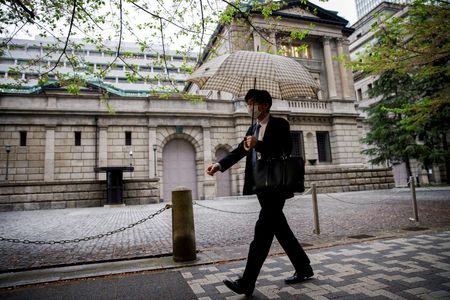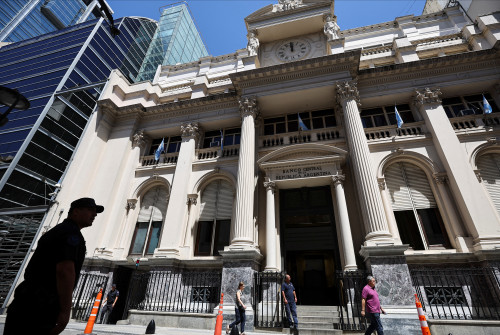By Leika Kihara
KAGOSHIMA, Japan (Reuters) -Bank of Japan board member Seiji Adachi said the chance of tweaking the bank’s yield curve control policy at next month’s rate review was small given diminishing market distortions and a lack of price trend data.
He also said the central bank does not use monetary policy as a tool to arrest yen declines, ruling out the chance of a near-term change to Japan’s ultra-low interest rates.
“The shape of the yield curve is quite smooth and the Japanese government bond (JGB) yield is functioning as a base rate for the corporate bond market,” Adachi told reporters after meeting with business leaders in Kagoshima, southern Japan.
“If market conditions don’t change much from now, the chance of us tweaking yield curve control in July to arrest any distortion in the yield curve will be small,” he said.
The remarks were the strongest yet from a BOJ policymaker ruling out the chance of a policy tweak at the next meeting scheduled on July 27-28.
With inflation holding above the BOJ’s 2% target for more than a year now, the bank is widely expected to revise up its price forecasts at a quarterly review of its projections in July.
That has led some market players to bet the BOJ could tweak YCC at the July meeting to address market distortions caused by its heavy-handed defence of the 0% cap on the 10-year yield.
Adachi said the BOJ must look at consumer price data for July onward to judge whether inflation was overshooting its baseline scenario. The July data won’t be available until after the BOJ’s July 27-28 meeting.
“Personally, I feel it’s hard to make a strong call on whether Japan’s price trend is overshooting our baseline scenario just with inflation data up until June,” he said.
“It’s therefore tricky to say we can change policy in July on the assumption that inflation is overshooting our forecasts or on track to stably hit our target.”
Adachi, who is considered one of a handful of advocates of aggressive easing on the BOJ board, said risks to the price outlook were skewed to the downside long-term due to a weak global economic outlook.
“In a sense, we’re moving closer to achieving our price target. But there’s high uncertainty over our baseline inflation outlook, so it’s premature to tweak monetary policy,” he said in a speech to Kagoshima business leaders.
BEHIND THE CURVE
Adachi’s dovish remarks echo those of Governor Kazuo Ueda, who has stressed the need to keep monetary policy ultra-loose until there is more evidence wages will keep rising next year, helping Japan sustainably hit his 2% inflation target.
But not all in the nine-member board seem to agree.
Minutes of the bank’s April meeting showed a number of board members warning of the side-effects of the policy and the risk of being too late in raising interest rates, highlighting a rift within the group on how soon the BOJ should follow global counterparts in phasing out stimulus.
At Ueda’s debut rate review in April, one member said the BOJ must ensure its policy “does not fall behind the curve,” as wages and inflation were already showing signs of accelerating, according to the minutes of the meeting released on Wednesday.
Another member said the BOJ must avoid a situation where it had to make abrupt changes to interest rates, as that would cause huge disruptions to businesses accustomed to extremely low interest rates.
“The BOJ must humbly monitor price and wage developments, and respond not too quickly, but also not too slowly” the second member said.
(Reporting by Leika KiharaEditing by Shri Navaratnam and Sam Holmes)





